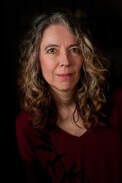|
Erica Goss interviews Nancy on "Postcards from a Drought" "Sticks & Stones" newsletter, Issue #39 March 2, 2020 A Closer Look: Nancy Carol Moody on the Writing of “Postcards from a Drought” At the February 2020 River Road Reading in Eugene, Oregon, I heard the poet Nancy Carol Moody read from some new work titled “Postcards from a Drought.” An unnamed man sends postcards to someone called “E,” short letters that become more and more unsettling. The narrator describes strange symptoms, mysteries that resolve themselves, and details about work in a detached, controlled voice that seems to foreshadow a coming disaster. (“Postcards from a Drought” will appear in an upcoming issue of Tampa Review.) I asked Nancy about the making of “Postcards from a Drought.” What follows is a condensed version of her response. EG: Where did the idea for “Postcards from a Drought” come from? NCM: This series of postcards resulted from a submission call for an anthology exploring the theme of “drought.” The definition of that word which most interested me involved the idea of a prolonged lack of something desired, a concept which neatly dovetailed with my obsession with the idea of displacement and my leaning toward the writing of persona poems. The unnamed sender of my postcards is, in the present moment, inhabiting a life not his own, but one to which he has been detailed to for an uncertain period of time. His drought is his exile from his own, familiar element. EG: Why choose the postcard as a vehicle for telling a story? NCM: I have a great fondness for postcards. I love sending them. I love receiving them. It’s not only about the images on the cards, but the connection between the front matter and the message on the back. I’m an unapologetic eavesdropper, and I find it fascinating to try to make a whole of overheard fragments. I’m also fixated with the idea (and power) of space—liminal, white. The necessary brevity of a postcard message amplifies the opportunity for the negative space to be exploited. What’s not said is as material as what is stated outright. For me, a postcard is one piece of a human jigsaw puzzle, and so it feels natural to try to bring a collection of such pieces together, to make use of the unsaid to expand the boundaries of the narrative, to fashion some sort of whole of the disparate parts. EG: You are a collector of postcards. Can you tell us about this and how it contributes (or not) to your writing practice? NCM: I participate in an international postcard program. I’ve sent nearly 1,000 postcards around the world and have received a similar number in return. I’m constantly reminded of our shared humanity, irrespective of our place of birth or residence. Closer to home, I randomly send postcards or other small matter to friends or individuals who have struck my fancy. I have an affection for the mails, in no small part due to having worked for the postal service for 26 years. But beyond that, it just pleases me that a small gesture (especially in these days of electronic communication) such as sending a card with an interesting image, a bit of text or markings, along with some surprising postage stamps can pop someone’s day with a spot of brightness. I don’t know that this habit informs my writing practice in any structured way, but I will say that I have learned a lot about myself by considering why some things fascinate and others do not. And writing to others encourages me to think outside myself. Also, the limited size of a postcard does require some thought as to how to best fill it. In this way writing a postcard is not unlike writing in form, which can be at once restrictive and liberating. Writing in “postcards” reminds me that every word matters. |

Erica Goss served as Poet Laureate of Los Gatos, California from 2013-2016. Her latest poetry collection, Night Court, won the 2016 Lyrebird Prize from Glass Lyre Press. She is the author of Wild Place (2012, Finishing Line Press) and Vibrant Words: Ideas and Inspirations for Poets (2014, Pushpen Press). She is the founder of Girls' Voices Matter, an arts education program for teen girls, and co-founder of Media Poetry Studio, a poetry-and-film camp for teen girls. Please visit her at: www.ericagoss.com. |